Eugene Lenti’s abuse case moves to federal court, amendment made to suit against DePaul
Former softball coach Eugene Lenti pictured at the 2018 Big East Championship.
An amended complaint to a lawsuit that was filed in April, which alleged former DePaul softball head coach Eugene Lenti had verbally and physically abused his players and an assistant coach, was filed on Tuesday, according to a document obtained by The DePaulia.
Unlike the first complaint, which was filed with the Cook County Circuit court by sports psychologist Jenny Conviser, this new one was filed with the United States District Court for the Northern District of Illinois Eastern Division.
It’s unclear as of right now why DePaul requested to move locations.
Conviser is accusing DePaul of wrongful retaliation under Title IX, breach of contract, defamation and false light, based on her mandatory involvement in reporting that Lenti had physically abused his female assistant coach and abused his female players.
Lenti surprisingly retired in the summer of 2018, with the athletic department not making any formal announcement. Last year, Lenti accepted a job at Auburn University as an assistant softball coach. His sister, Jean Lenti Ponsetto, has been DePaul’s athletic director the last 18 years — but will also be retiring this summer.
After Lenti left, DePaul also let assistant coaches Lindsay Platt and Lynsey Ciezki leave the program.
According to the new lawsuit, DePaul never notified Auburn of Lenti’s misconduct and never properly reported the incident to the U.S. Center of SafeSport, which is legally required.
Conviser had worked at DePaul since 2005 as its “lead mental health provider,” but said her contract was terminated in April 2018. The suit claims DePaul also “outsourced” its on-campus health counseling services to Conviser.
According to the complaint, DePaul retaliated against Conviser after she began exposing DePaul’s “corrupt Title IX office and penchant for coverups.” The complaint also accuses DePaul’s leadership and the Title IX office of being conflicted and terminally under the sway of the athletic department.
The new complaint also says that Conviser was at the center of taking on Lenti Ponsetto and taking down Lenti by having him eventually separated from DePaul for his abusive conduct to his players.
The lawsuit also alleges that because Lenti Ponsetto is DePaul’s athletic director, Lenti was able to create an “abusive cult of personality.” According to Conviser, she had multiple in-person meetings with DePaul athletics’ senior administration, including Lenti Ponsetto, about the operation of DePaul’s Title IX office and the need to improve the university’s Title IX office.
Michael Popok, one of Conviser’s lawyers, told The DePaulia that Conviser had a meeting with the Title IX office, the associate athletic director, head of sports medicine and Lenti Ponsetto prior to Conviser getting fired. In the meeting, Conviser expressed her belief that DePaul was lacking in offering better mental health services to student-athletes.
According to Popok, everyone else in the room just stared at Conviser without believing what she was trying to tell them. Conviser also said that Lenti recruited the most vulnerable student-athletes, but her concerns were first met with silence and then denial.
Jill Hollembeak, DePaul’s senior associate athletic director for varsity sports, allegedly disagreed with Conviser that bad things could happen at DePaul and said that improper conduct “doesn’t happen here” and because the school is located in Chicago there are other entertainment and diversions.
In 2016, Conviser reported to DePaul incidents of inappropriate verbal abuse from Lenti towards his team, including him calling his players “f—-g whores.” But, according to the complaint, Lenti was protected by Lenti Ponsetto and the conflicts of interest between DePaul’s Title IX office and the athletic department. On October 10, 2016, Conviser provided Lenti with his own personal copy of Title IX.
According to Conviser, that put her in conflict with Lenti Ponsetto who was trying to protect Lenti.
DePaul’s Title IX office did not investigate Lenti’s behavior to determine if Lenti abused his players, the lawsuit alleges. According to the complaint, this is a violation of DePaul’s requirement under Title IX and U.S. SafeSport protocols.
In 2018, Conviser was informed by one of her therapists that a softball player saw Lenti punch his associate head coach in the face. Conviser said the player reported what happened to the school’s Title IX office, which opened an investigation.
The results of the investigation are unknown. The lawsuit said the investigator improperly disclosed the player’s identity to her teammates, who blamed her for “getting Lenti in trouble.”
Prior to filing the first lawsuit, Conviser and her lawyers wrote to DePaul President A. Gabriel Esteban about the Lenti scandal. According to Popok, Laura Warren, a former member of DePaul’s General Counsel’s office, responded by denying the allegations against the school.
Warren is no longer an employee at DePaul, and is now the General Counsel with Major League Soccer team the Chicago Fire. The DePaulia requested to speak with Warren, but she declined the interview.
The DePaulia also requested an interview with Jose Padilla, Secretary of the University Vice President, General Counsel, to talk about his office’s response to Conviser’s concerns. But Padilla declined the interview and said nobody else from his office will discuss this matter.
“Neither will any of his present or past lawyers from the Office of General Counsel speak with the media about this,” Padilla said in a statement. “And neither will our Board of Trustees or university executives do so. They have a long standing practice of not discussing on-going litigation with the media or anyone else.
“The University has retained the law firm of McGuireWoods to represent it in this case. The firm will do the university’s talking in court where it really counts. If you wish to learn more about the university’s position in this case, we recommend you read our pleadings as they are filed with the court.”


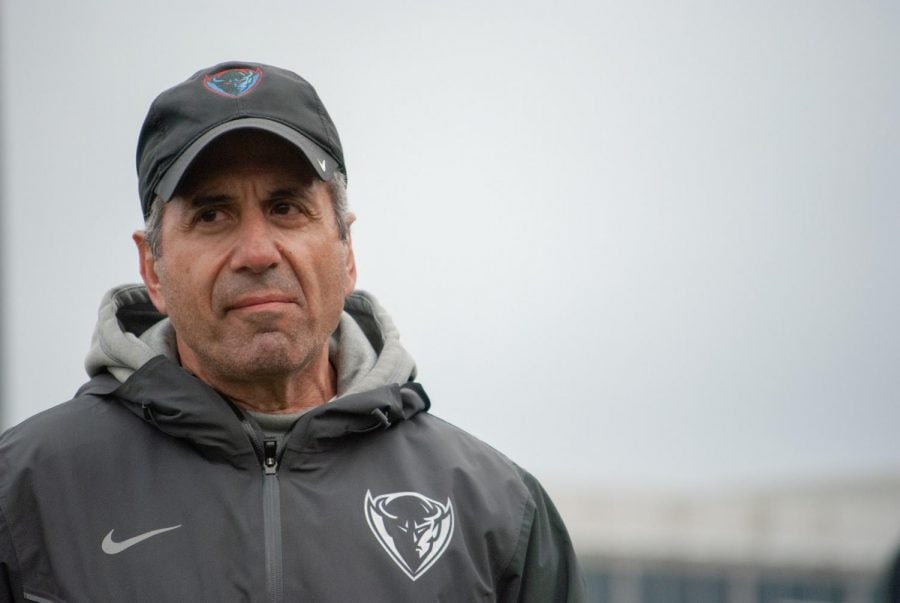

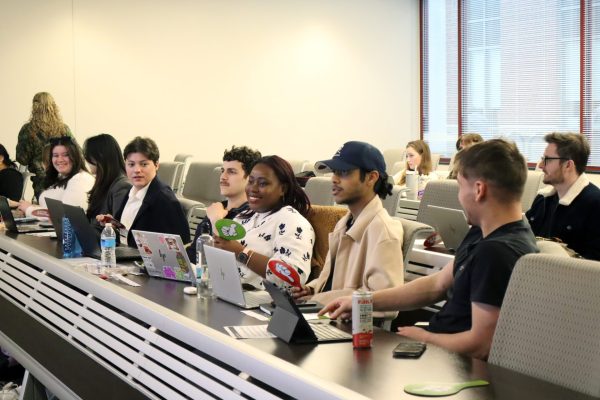
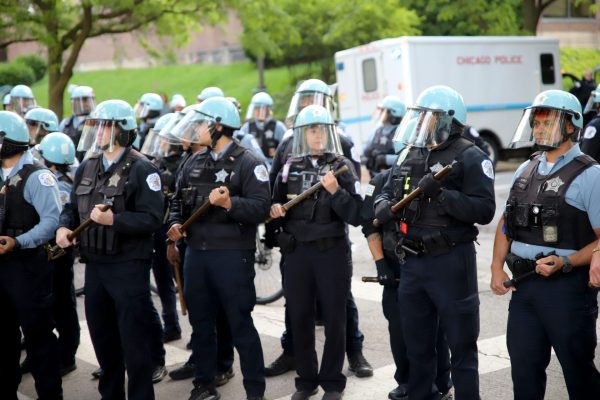

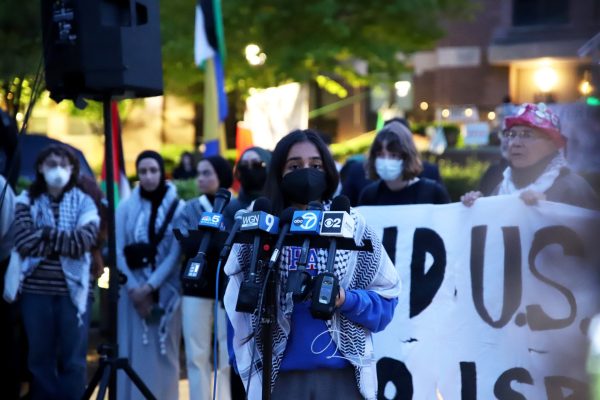




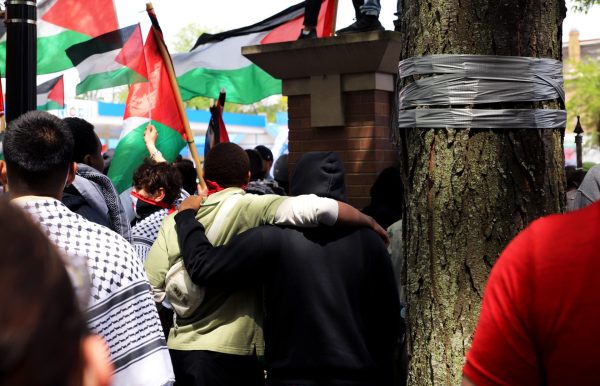
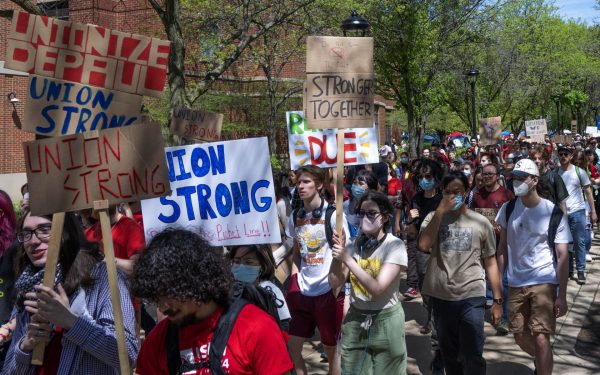
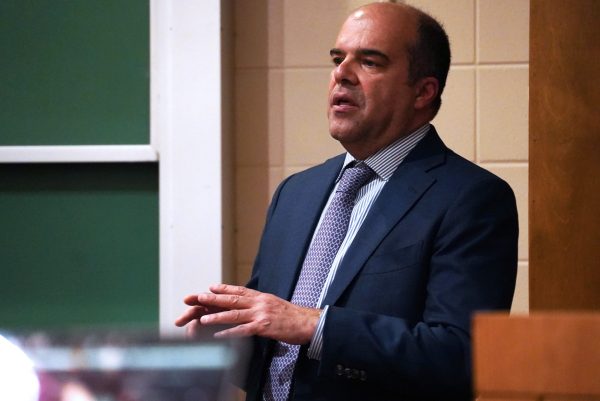


Darnell • Jul 4, 2020 at 5:28 pm
Michael you right. Thank you for help. This bad and General Counsel and Title IX Office in Student Affairs did bad by DePaul. Could have been fixed by DePaul by only paying Conviser what she was owed and not letting Title IX in Student Affairs get away with it. They all bad.
Michael Patrick • Jul 1, 2020 at 4:51 pm
Jennifer,
I never suggested there was a “toxic environment” on DePaul’s Softball team. I have no clue if that was the case. I did say, 30 + years ago, anyone who walked past McCabe or Corcoran Halls’ (or was waiting for a train on the Fullerton “L”) would watch or hear Eugene Lenti screaming, like a lunatic, at his players. This was not an isolated incident. This was so common and entertaining – not proud to say this, yet it became a fun distraction, periodically watching from the dorms or north stairway of McCabe Hall. After hearing this story, I cringed. I hadn’t thought about what I witnessed 30 + years ago. ( Those were different times.) Call it Catholic guilt, but the feeling of, “I should have said something“ has troubles me deeply. ( Who was I supposed to tell? His sister? ) This is why I have been paying close attention to the updates on this case. ( I did highlight yelling at players is not necessarily a crime or a reason for dismissal. If so, such behavior would rid the ranks of coaches throughout all sports.)
Jennifer, I am not connected to the university in any way. I do not have a gripe with this former coach, Eugene Lenti. I don’t even know him, personally. As a former student-athlete, I do remember Jean Lenti-Ponsetto. Back then, she was a grand, self-promoter, always talked about her amazing communication skills, and she really thought she was a comedian – she was not even remotely funny. I recall her as having no filter. That is my recollection. I was a kid. Outside of that, she was cool. It’s only the last handfuls of year’s her name has resurfaced. That’s because of scandals and poor performances from our only revenue – generating sport. There’s no point in beating a dead horse here. It is what it is. My apologies for getting off topic…
To be clear, you or I did not invent this scenario/case because we are bored over the COVID lockdown. I have a very busy career. This situation was forwarded to me two years ago. Something did seem amiss when a hall-of-fame coach suddenly “retired” after 37 years, with no fanfare. No retirement celebration, no acknowledgement by the university, no “good-bye” final year swan-song tribute by your decades’ long competitors, no “Eugene Lenti Day” by the Mayor of Chicago. There wasn’t even a transition plan to transfer coaching powers. Both assistants’ contract weren’t renewed. Nothing was known or planned. At the very least, it’s poor and unusual planning. Maybe this is what Eugene Lenti wanted: Out the back door and poof – not even a thank you after 37 years. Who am I to judge? I’m nobody in this case. Once again, it’s my disturbing recollection of Eugene Lenti screaming at players that has troubled me. ( If Mr. Popok, Esq., wishes to talk to me – to show a pattern, I’ll give him permission to use my name. I won’t hide behind this forum. I’m not intimidated by anyone at DePaul.) Unfortunately, it’s when anonymous comments started percolating in the comments section, from past articles, that I became alarmed. Some painted a disconcerting and disturbing picture – again, gossip and innuendos. This continued for two years – well before this wrongful – termination lawsuit.
Of course, I did read from Eugene Lenti’ s players that although he talked about retiring, they were all surprised. Clearly, Eugene Lenti is loved by many of his former players. I respect and admire that.
Ms. Conviser’s intentions, and the merit of this case, will be battled in the court of law, not the court of public opinion. As Ms. Conviser was, or as DePaul contends, still is, a hired consultant, how much money can she really expect to secure with this lawsuit? Not much. She’s not even an employee. Do you really think any university will ever hire her after this public lawsuit? Not a chance in hell. Then, why would she jeopardize a very successful consulting business for a few bucks? Don’t answer that. I withdraw the question.
Jennifer, you are correct there should be a police report. This is why I suggested the DePaulia show up at Bob Wachowski’s office, at DePaul Public Safety, on Monday morning to review and copy all reports – if any – related to this case. Let them tell us in this week’s DePaulia what they uncovered. If there’s nothing there, as you hint at, then the truth shall set Eugene Lenti free. I’m sure he’s gone through hell. If there’s nothing there, then stop this now.
I beg to differ DePaul “doesn’t care what happens to Eugene Lenti,” as you suggest. They have very strong reasons to terminate this civil lawsuit. It’s called a financial settlement, additional lawsuits – potentially, and a PR nightmare. Mr. Michael Popok, Esq., has made DePaul look like a bunch of buffoons. This is why I strongly suggested the solution is so ridiculously simple; the women don’t even need to engage attorneys. Three letters are written, signed and notarized, voluntarily. One by the affected assistant coach – you claim it’s Ms. Platt, denying being punched in the face. The second, by the alleged player, denying or recanting Ms. Conviser claims to have witnessed the alleged punch to the face of the female coach. And third, a letter from the impacted team(s) players denying they were called “ f—ing whores.” If this occurs, then this case disappears today. (DePaul has had TWO YEARS to secure these letters. They failed.) In turn, The DePaulia publishes the respective letters and police – report findings, and voila, this case instantly disappears by the 4th of July! That’s my simple and easily attainable solution. If this happens, then all the windbags, like me, go back to our lives. I don’t want to hear any more scandals from my alma mater; it’s institutional nepotism that has got them in trouble.
Jennifer, since this is really a nuisance lawsuit, as you convincingly detailed, let’s get those three letters to the DePaulia, by tomorrow’s deadline. They will report their findings, on Friday. This requires no exchange of money, no legal or university intervention, and voila, everyone enjoys the holiday. No more defending or denying. Set up a Zoom meeting tonight and get the letters to the Depaulia by their deadline tomorrow. I don’t want to hear any more excuses.
Jennifer • Jun 30, 2020 at 10:11 pm
Although I know that it has been pointed out before, I will say it again, it is very simple to find statements from players on Coach Lenti’s recent teams, their parents, and members of his staff in the final years.
If someone was punched, don’t you think that they would have filed a public safety report at a minimum. I am pretty sure that they would not have posted a comment of “Just to set the record straight, my departure from depaul had nothing to do with Eugene’s retirement. I resigned in May and moved back to California to be closer to family. I’m grateful for the time that I was able to play for and coach with Eug. He made me a better player and coach. Glad I was able to be part of his staff and finish on top!!” (This quote from Lindsay Platt can be found on another DePaulia Article). Additionally, as Michael Patrick pointed out, Eugene Lenti is about 5ft 7in/180lbs while both Platt and her husband are over 6ft with her husband out-weighing him by close to 50lbs. So you are going to tell me that this “short guy” punched a woman in the face and there was no police report or even malice from the other adults that were involved in the debacle?
Michael Patrick makes it seem like this was such a toxic environment but Coach Lenti was bringing in exceptional recruiting classes, and how do you recruit if everyone is scared? There were girls from the same neighborhoods and families as well as travel teams and high schools, so why would these young women tell their families and friends to join the community if it was so miserable?
Honestly DePaul probably doesn’t care what happens to Eugene Lenti because he is no longer their employee. They won’t defend him and what this woman is saying about him because, as far as they are concerned, they just have to prove that what she is saying about THE UNIVERSITY itself is untrue.
Michael Patrick • Jun 28, 2020 at 8:14 pm
The DePaulia (and Jethro),
Based on DePaul’s response, I did not read where they are disputing allegations of abuse and/or assault. Rather, DePaul is arguing that Jenny Conviser was not a principal character in “taking down” Eugene Lenti. They are even disputing her contention that she was fired. Wow! This reads like a Seinfeld episode. This strategy must work magnificently in court, but in the eyes of public opinion, DePaul looks like its trying to find a legal loophole to sweep these allegations away. Just my opinion.
Based on DePaul’s narrative, they are attempting to have this case dismissed because Ms. Conviser is “bootstrapping” her departure to the highly publicized separation of Eugene Lenti. If this is accurate, I can guarantee with confidence, nobody is interested in reading about an HR squabble. In this scenario, DePaul’s legal-eagle team response of “not discussing litigation with the media or anyone” is perfectly acceptable.
However, what keeps bringing me back to this case is DePaul University lambasts Ms. Conviser but never touches the nucleus of public concerns that have been speculated for two years before this lawsuit: alleged abuse, corruption, misconduct and retaliation. Ms. Conviser’s lawsuit was just the straw that broke the proverbial, camel’s back. I believe this is what needs to be accurately investigated by the DePaulia and other media outlets. IF the accusations are true, and there was a concerted cover-up, as the defense argues, then the DePaulia must report its findings. This is, in part, Ms. Conviser’s argument of why she was fired: she was a whistleblower! ( If I’m incorrect, please let me know. I really want to be 100% wrong on this.)
I respectfully ask the sophisticated and diligent team at the DePaulia to release, with necessary redactions, the publicly available files DePaul University’s Public Safety Office and the Chicago Police has regarding these allegations. Include statements from Eugene Lenti, his sister, Jean Lenti-Ponsetto, the assistant coaches, players, associate AD, Ms. Conviser, the staff psychologist, etc. I have never read information that this was even investigated by the police. Please clarify.
I believe a person’s name should not be besmirched for public entertainment. It is no secret that Eugene Lenti has a bit of a temper. ( I’m going back 30+ years folks.) However, this is not a crime or in the coaching world, it’s not even considered a dismissible offense. We get that. But these allegations, by Ms. Conviser and her astute attorney, Mr. Michael Popok, Esq., are shockingly disconcerting.
Honestly, I only care about the girls and women who were allegedly impacted here. Money can be replaced. I’m praying these are false allegations, yet DePaul is not helping much. Again, from reliable sources, like the DePaulia, Chicago Tribune and New York Post, we have read : alleged abuse, corruption, misconduct, and retaliation. If none of this occurred, then DePaul’s legal team could send a one – paragraph letter to all media outlets, including the DePaulia, stating such. Criminal allegations have nothing to do with this wrongful – termination lawsuit. This is a civil case. The fact of the matter is Ms. Conviser was not punched in the face or verbally assaulted. She’s alleging others were. There is no reason DePaul can’t tell the truth, right now, regarding these matters. If I was false accused, I’d want my employer to be my biggest advocate: not tomorrow, TODAY!
We are all too busy in our lives and careers to worry about the integrity of our alma mater. But this is where the leadership of DePaul has placed us today, We will not leave until there is a satisfactory resolution. Because DePaul seems to have been less than transparent and forthcoming – they had two years, this is why we are suspicious. To date, no national news outlets has shown interest in this case, minus a passing swipe. So far, I think DePaul is beyond lucky. Any way you slice it, this case is potentially the worst public PR nightmare DePaul has ever faced. ( COVID, protests and riot coverage has saved DePaul, to date.)
I are not interested in parroting gossip or innuendos. ( If I have, I definitely want to be corrected NOW!.) Real human beings were affected here. The truth deserves to be uncovered and reported. Let the truth be the finish line. This is not a case of “DePaul has its own way of doing things.” They don’t get a free pass here. For everyone involved, please do the right thing: tell the truth and things will be okay. I continue to pray for those involved. Stay safe!
Jethro Smith • Jun 26, 2020 at 2:36 pm
Excellent suggestions offered above but, Michael, as well you know, DePaul has its own way of doing things. Just look back at the Ben Shaprio debacle, for one, and draw your own conclusions A rudderless ship somewhere east of Saginaw heading towards ground zero. DePaul, these days, seems to be fighting multi-front wars that it shall never win. I’m ashamed to haveh had any association whatsoever with the school.
Michael Patrick • Jun 26, 2020 at 11:18 am
There is a relatively easy way to resolve this case:
1) Both Assistant Coaches, Lindsay Platt and Lindsey Ciezki, write a letter to the DePaulia – should have been done two years ago – to unequivocally deny neither was physically assaulted by Eugene Lenti. Jenny Conviser is alleging ONE of these coaches was punched in the head by Eugene Lenti. This is a disturbing criminal allegation. There is no wiggle room here. If both former DePaul coaches deny the allegation, then Ms. Conviser’s case partially implodes in the court of public opinion and is definitely thrown out in the United Stated District Court. ( I just presented DePaul with the easiest financial and PR option available to conclude this case. DePaul has just saved millions of dollars in legal and settlement expenses. You’re welcome!) Unfortunately, DePaul University’s leadership couldn’t achieve something so pathetically simple – based on their assertion this is a baseless lawsuit. I find this to be deeply disturbing;
2) All team members from the 2016 DePaul Women’s Softball team voluntarily write and sign a group letter to the DePaulia, unequivocally denying they were ever physically touched, grabbed, slapped, pulled-including ponytails, punched, or in any other way physically assaulted by their coach, Eugene Lenti. In addition, they include in their letter that Eugene Lenti never called them “f***ing whores.” Every person who has waited for a train at the Fullerton “L” or walked past McCabe or Corcoran Halls during practices has heard Eugene Lenti screaming, like a lunatic, at his players. I just thought Eugene Lenti had a “short-guy” complex. In hindsight, it shouldn’t have been so entertaining to watch or hear. ( I feel horrible that this was happening back in the 80’s – never thought it was to this level of alleged abuse, and it horrifies me that this might have occurred for the decades since.) Regardless, if points #1 and #2 are achieved, Eugene Lenti can move on with his life, sue Ms. Conviser for defamation – she is a very successful business person, and he will retain his position at Auburn University;
3) Jennifer Conviser’s colleagues at DePaul must come clean and share what they know. There is no reason to lie or cover for an alleged, bullying boss. She’s finally out! If there is nothing here, DePaul presents affidavits to Ms. Conviser’s attorney, Mr. Michael Popok, Esq. This would be strike three against Ms. Conviser. A perfect strikeout pun to end this disturbing and disgusting case. Unfortunately, this doesn’t seem to have happened. Here again, this whole case stinks to high heaven!
What I am trying to wrap my head around here is if these allegations were baseless, as DePaul University has consistently argued, then all affected parties could have resolved this dispute before it became public. A resolution did not happen for reasons we can only speculate. And that speculation has been percolating in the media, such as DePaulia, Chicago Tribune, New York Post, TMZ, etc. for two years. DePaul University could have nipped this in the bud, yet without any sort of coordinated defense, DePaul University and it’s Athletic Department is being pummeled and dismantled by a little known attorney by the name of Michael Popak, Esq. ( He’s a huge name now!)
From legitimate media sources, I am reading DePaul University is covering up for a very corrupt and “mob-like” Athletic Director, Jean Lenti – Ponsetto. To be very clear, these are not my words. One fact is very obvious: One party is lying here! Eugene Lenti’s name has been permanently tarnished, really destroyed. There is no going back. If he is innocent of these charges, and I’m praying for the sake of the girls’ he is, there is no amount of money that could make his name and character whole. In fact, if you Google Eugene Lenti’s name now, this case is what you see first, not his successful coaching career. If the allegations are true, well, this case is going to destroy DePaul University and it’s Athletic Department for decades to come. And to the girls and women, I pray it didn’t happen, but if it did, the truth must be told.
Ms. Conviser has accused, in part, Eugene Lenti of committing criminal offenses and his sister, Jean Lenti-Ponsetto, as an accessory to felonies. Obviously not in their civil case but these are felony accusations still. ( I know, Jean Lenti- Ponsetto’s husband was one of the most powerful and distinguished Illinois prosecutors ever, and is a former DePaul Basketball player. That’s what makes this story ever more surreal!)
I have one question that has been glaringly overlooked – at least to me – for DePaulia’s diligent and talented staff. My question is: Since these criminal allegations have been in the public eye for a couple years, why hasn’t law enforcement investigated these criminal accusations? If they have, then my first two points have already been addressed and dismissed – at least as a criminal matter. This angle has never been argued or addressed. At the very least, did DePaul’s Public Safety Department, led by its crack- leader; “Mr. No Personality” Bob Wachowski, ever investigate or forward a report to the Chicago Police Department for further investigation? If not, why?
I say, with the deepest level of disgust, the leadership of DePaul University has done an unconscionable and reprehensible job of investigating, controlling and containing this disturbing case. You have brought shame to DePaul University. As an alumnus, a former student-athlete, and yes, now an outsider, DePaul University looks guilty of at least a cover – up. Hopefully, not more. Just a few weeks ago, Jean Lenti – Ponsetto’s contract was not renewed and she was finally offered the humane option of “retiring.” (She shouldn’t have been hired as the AD in the first place, yet thank God it’s over.) Her departure is a great, first step. Without question, DePaul University’s Board of Trustees must ask for and accept President Esteban’s resignation. Under his watch, there have been several disturbing cases in the university as a whole, and his Athletic Department in this case, that have been horribly botched. This case has caused national disgrace to the once proud reputation of DePaul University. Mr. Esteban seems to run the university like an unorganized, undisciplined frat house!
As an alumnus and former student – athlete, I cannot fathom any reason why a current or prospective donor would even consider making donation, of any amount, but definitely not a major gift, to DePaul University for the foreseeable future.
To DePaul University’s Board of Trustees, you must be fully transparent and honest to your current student-athletes, student body, parents, alumni, employees, and the community. You created this monster! We deserve to know if the university we love is now corrupt! Please clean-up DePaul University’s Athletic Department – and your overall finances – and start giving your current students and alumni a reason to be proud to call DePaul University home! It’s been decades since I could state this without laughing – really crying! To Mr. Michael Popak, Esq.: Please do not walk away with a monetary settlement and no admission of guilty. If there were bad things that happened, then make sure this never happens again! Ms. Conviser has put her career and long-term reputation on the line. Continue to put the girls and women who were allegedly impacted FIRST! I know you will! Stay safe and healthy!